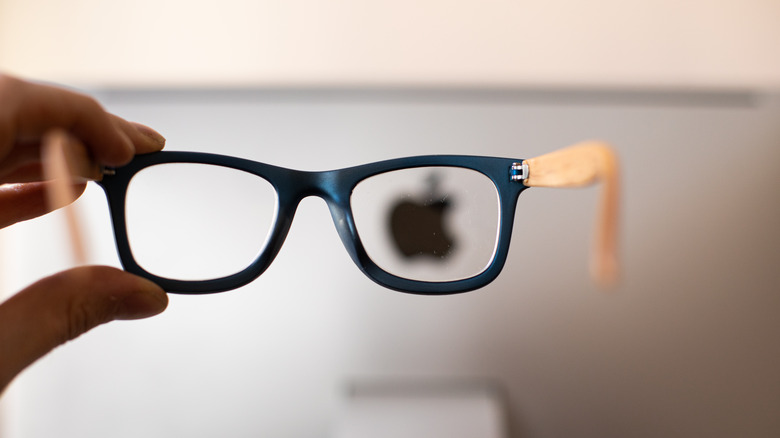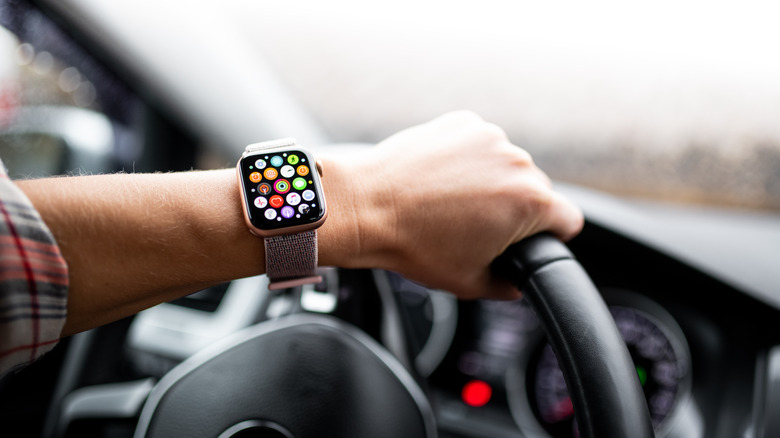Inside Apple's Crazy Patent For Their New Car
Rumors began swirling about Apple's upcoming and first-ever car in 2015 when the tech giant established "Project Titan," a research and development initiative that explores the wonders of electric vehicles and autonomous driving. The Wall Street Journal reported in 2015 that Apple is "accelerating efforts" to make a production-intent Apple Car by 2019, but Apple had other things in mind. The company laid off 200 employees from Project Titan in early 2019, said CNBC, preceding the first wave of layoffs in 2016 as Apple shifted its focus from EV development to autonomous driving software.
Most recently, the Apple Car resurfaced in worldwide headlines when official patents leaked about a fully-autonomous, self-driving electric vehicle equipped with an in-car VR entertainment system. As first detailed in a report by VR Scout, Apple filed a patent with the United States Patent & Trademark Office for an innovative virtual reality in-car entertainment system that uses vehicle movements as part of the VR experience. The report came with a Twitter post that said, "Apple's self-driving car could feature VR technology and no windows," along with a concept image of a mouse-shaped Apple Car with no windows.
Apple's self-driving car could feature VR technology and no windows: https://t.co/86T8nP1LOX pic.twitter.com/YCwrVrJRjc
— VRScout (@VRScout) May 17, 2022
Mark your calendar: Apple Car may debut in 2025
According to Bloomberg, Apple is (again) accelerating the development of its newest electric car, but the project has refocused on full self-driving capabilities. The report adds the Apple Car team (no mention of Project Titan) had explored two options over the years. The first is an Apple Car with limited self-driving capabilities, mainly steering and acceleration. The second is a self-driving, fully autonomous car that functions with zero human intervention. Under the watchful eye of new Apple Car team leader and Apple Watch software executive Kevin Lynch, the tech giant is now reportedly focusing its efforts on the second option and allegedly plans to unveil a production self-driving Apple Car by 2025.
Shifting its focus to self-driving cars may explain why Apple's busy filing new patents left and right. It recently won a series of 53 newly granted patents from the U.S. Patent and Trademark Office, including patents for a Dynamic Focus 3D VR Headset Display and a Virtual Reality System. The patent states that Apple's VR system has a direct retinal projector system that scans images pixel-by-pixel directly to your eye's retina.
The patent further explains that the new VR system eliminates accommodation-convergence mismatch problems like headaches, nausea, and eyestrain, which are prevalent among users of conventional VR and augmented reality systems. We can see how Apple's latest inventions can migrate to in-car entertainment, but we have no idea why the incoming Apple Car would make do with no windows; it'll probably have a windshield and front-side windows at the very least. However, passengers could immerse themselves in a unique virtual reality experience while on the go despite Apple's persistence in referring to its new technology as a "VR system for use in autonomous vehicles with no windows."
Car chases and the zombie apocalypse
Think again if you believe nothing is more remarkable than playing "Cyberpunk 2077" or "Fallout Shelter" in your Tesla EV. Apple's advanced AR/VR headset for autonomous vehicles takes it a few steps further. More than just video games, Apple's patent describes a VR system that would offer a real-life view of the road or enable passengers to hold virtual meetings as if the participants are inside the vehicle. On the other hand, the system could allow users to visualize themselves on a boat floating down the river or soaring over the sky in a glider as the vehicle travels over the road.
What's more interesting is the interactive nature of the Apple AR/VR headset. Patently Apple notes the system described in the patent would allow users to immerse themselves in a "road race experience" or "run over zombies in a post-apocalyptic landscape." When the vehicle is at a stoplight, the system could make it seem the car has stalled and will not restart until the light turns green "to build suspense" in the game. Toms Guide says the envisioned experience includes 4DX touches (simulating wind blowing in your face, for instance) and motion-integrated scenarios (the VR system integrates with the car's motion). Yeah, that's a sure-fire thing to keep the kids quiet at red lights or during those long journeys.
Of course, Apple's AR/VR headset is not merely for entertainment or simulating a zombie apocalypse. Users will presumably be able to use the device to discover historical landmarks, have a virtual view of a city while traveling, or ride through fictional cities or landscapes. We don't know about you, but we'd choose running over zombies over making virtual tours any day.


